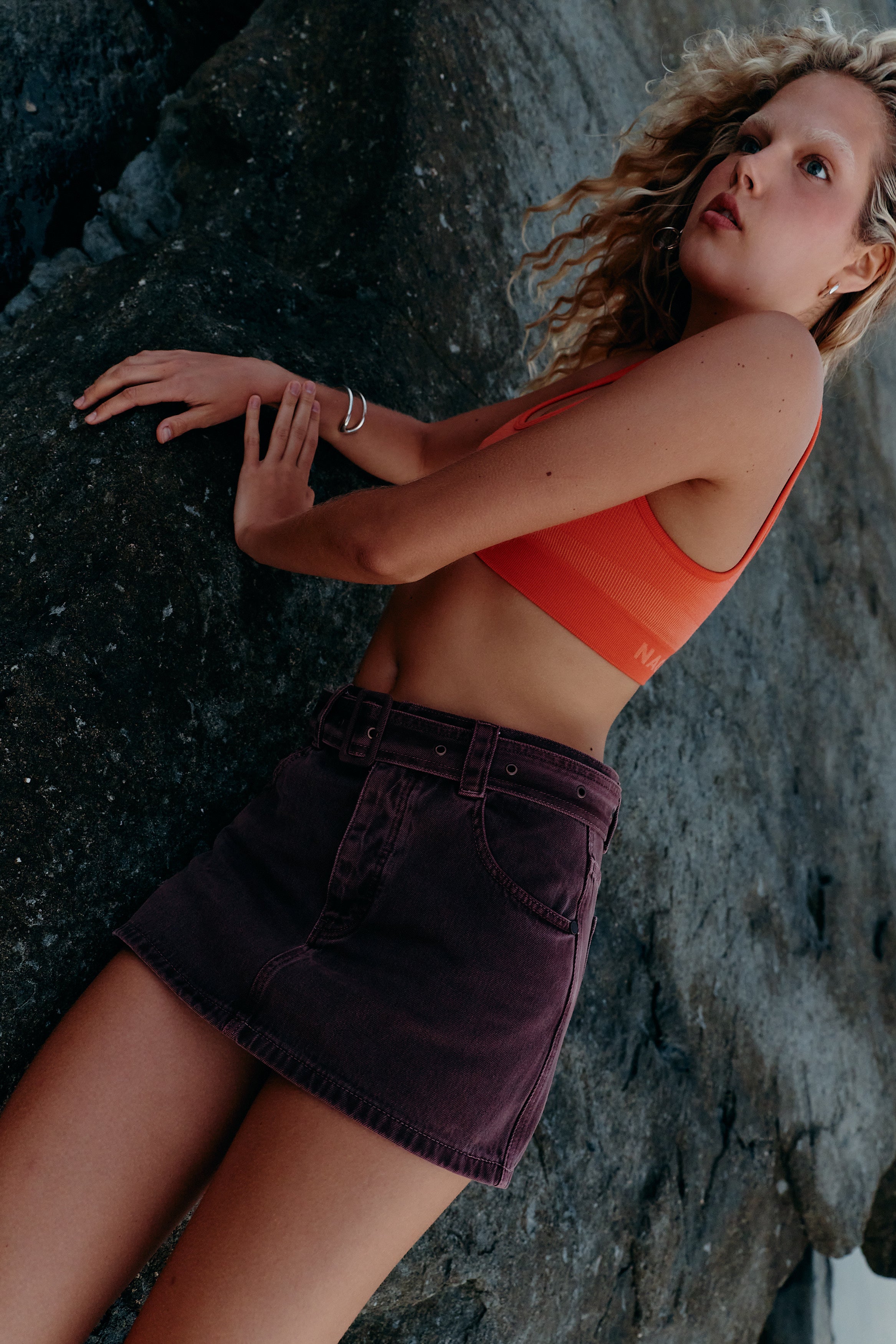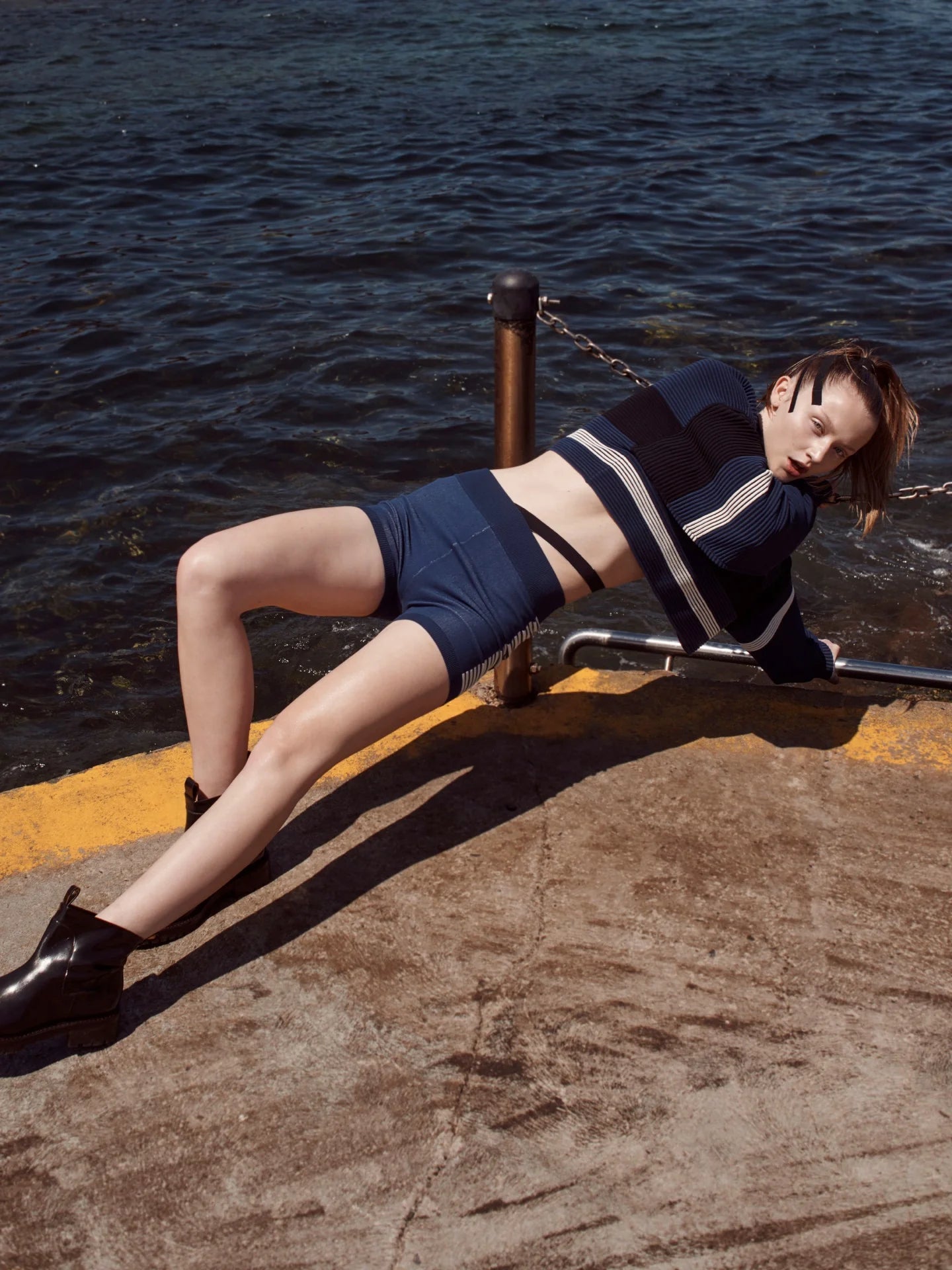BLACK MAGAZINE INTERVIEW
Nagnata founder Laura May spoke with Chris Lorimer from Black Magazine, about purity in the design process, influencing self-esteem and when caring equals business success.
Read the full storyBLKONBLK
Photographer Scott Lowe
Fashion and Interview Chris Lorimer
Beauty Annette Mckenzie
Model Charlotte Mullan

What is Nagnata’s fashion ethos?
We are driven by design and textile innovation and believe style does not need to be sacrificed in the pursuit of sustainably produced fashion. We don't follow fashion trends and design in “movements” rather than follow strict fashion seasons. Each collection is an evolution of the previous one made to be complementary and styled together. We don't believe our designs will date or go ‘out of fashion’ and to support this messaging we avoid end of season sales. We focus on creating directional yet timeless designs which women like ourselves want to wear every day because they're stylish and comfortable. You can wear our organic cotton technical-knitwear collection for all occasions from yoga practice or exercise to the beach or styled back with your fashion wardrobe. The Nagnata woman invests slowly in pieces to build her wardrobe and get lots of wear for the investment.
And what does your brand stand for?
Nagnata aims to redefine value and challenge the rampant consumerism engendered by fast fashion. Our philosophy when approaching each collection is one of sustainably minded design. It’s a continuous negotiation between what is the most environmentally conscious option that will still enable us to make a high-quality garment that doesn't compromise our design integrity. At the core of our brand is a spiritual messaging, as the label name is derived from the Sanskrit word ‘nagnatA’, which translates loosely as nakedness. The concept of nakedness alludes to being raw, exposed and in one’s natural state. This relates to the practice of yoga as a pathway intended to reveal one’s internal resistance and return to a more natural and authentic state of being. This concept of nakedness speaks to the purity of our design philosophy with the organic and natural fibres we choose to work with, and the zero yarn waste approach to the fashion knitwear collections. We want to inspire women to feel empowered and beautiful in their natural bodies and feel confident and expressive in the clothes that we're designing. Our technical knitwear is designed to support and shape the body but not restrict your breath in practice, unlike the majority of tight, lycra activewear on the market. We use lots of vibrant colour as it carries an uplifting energy and the collections are presented in a way to celebrate the movement and vitality of the human body.

What do you think the role of a fashion designer is right now?
The new generation of designers needs to think beyond glamour and profit to social responsibility and the impact they can make as a brand. Owning a brand, or any kind of company, you have the opportunity to use your voice. You can potentially play an important part in influencing the industry, consumer behaviours and women's self-esteem. We are conscious of the message we are communicating with our audience. We try to work as sustainably as we can, be transparent with our production methods, successes and struggles and also promote an attainable healthy lifestyle. We recognise that sustainable practices surrounding design and business are a complex world of interconnected challenges, but as emerging designers we believe we need to commit to make the most environmentally conscious choices and drive innovation in the industry.
What differentiates Nagnata from other labels in the knitwear and activewear space?
We sit in between contemporary fashion, lifestyle and active and offer an unconventional concept to these markets. Our innovative approach towards sustainable textile development and an identifiable design aesthetic merges contemporary fashion with retro-sports and a nod to 90's styling. We use 85% certified organic cotton and plated the 15% spandex or nylon, so the organic cotton fibre is what predominantly touches your skin. The idea for the knitted textiles was originally inspired by retro knitted swimsuits from the ‘20s that I was sourcing from the markets in LA. In my personal yoga practice, I tended to wear vintage knitwear; cotton or luxurious Italian knit bras, as I didn't like the restriction of lycra activewear or high synthetic content against my skin. Our skin is our biggest organ and absorbs the toxins and chemicals from the textiles we wear on our bodies. Synthetic fabrics are mainly derived from petroleum and these petrochemicals are not something you want your skin absorbing, especially in yoga and breath focused practices when your pores are so open. This was the starting point for our textile development and design concept. It took two years of development and various fashion factories to reach the final collection. I think a lot of brands don't bother to go to this level of experimentation because it takes so long, and prefer to buy existing fabrics. I've always been more interested in creating all aspects of a garment, starting with fabric so we can control the hand feel, weight, performance and pattern. Also, I couldn't find what I wanted on the market so we had to make it.



"We support the slow fashion movement and offer all women a better choice over the sustainability attributes of their wardrobe, and the power of their purchasing to make an authentic change"
And why does our world need what you design at this moment?
The world doesn't need Nagnata, but the world does need to support conscious independent brands and companies. If a woman feels like she needs a new piece of clothing for yoga, fashion or life, (which let's be honest we all do sometimes!) then I'd hope she sees the value in investing in one of our pieces over something from a brand that is working in a disposable fast fashion model. We support the slow fashion movement and offer all women a better choice over the sustainability attributes of their wardrobe, and the power of their purchasing to make an authentic change.
Beyond putting your work out there to be bought and sold, do you think it’s important to contribute to society as a whole?
Most definitely, as designers and business owners it's our responsibility to contribute positively to society and consider the sustainability attributes when making a product. We all know too much about the harm fashion causes the environment, not to acknowledge this and take action. Consumers are also waking up and becoming more conscious of the brands they support. So even for those companies that don't care about the environment, if you want a successful long-term business then you need to start caring. Our intention for Nagnata is to encourage a culture of conscious consumerism with our customers by designing premium products that offer versatility, longevity and sustainably minded design. We want to work on this for years to come so creating a fashion brand based on trends that will inevitably date, or a design aesthetic that can't evolve and grow as we do with age and experience doesn't interest us.
What is the best piece of advice you’ve ever received?
We grew up with our parents encouraging us to focus on what we loved doing creatively and build a career around that. To question everything, follow your intuition and don't be afraid to not conform. It's not so much a single piece of advice but an attitude towards life that has given us the confidence to pursue our ideas and dreams, without the fear of failure.



